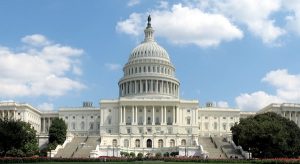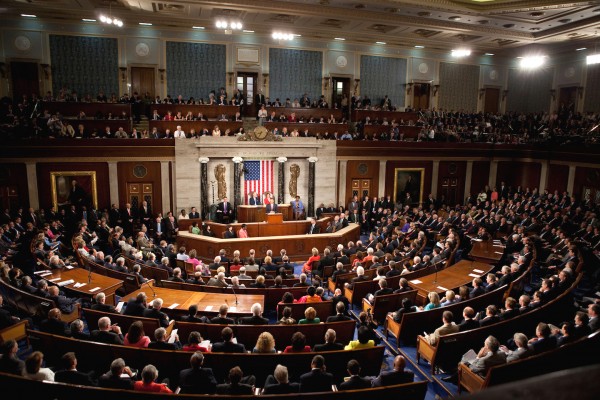Should Congress Pass The REINS Act?
A series of proposals centered on regulatory reform are squarely in the cross-hairs on Capital Hill. This includes the Regulations from the Executive in Need of Scrutiny Act (the “REINS Act”). Long-brewing concerns about over-regulation, law-making, lack of accountability, rule-making abuses, waivers and more are driving lawmakers as they consider a variety of proposals. The over-riding consideration is this: over the past 80-plus years a major transformation in the structure of the federal government has occurred at the most basic constitutional level. There has been a continuing transfer of power from the legislative branch to the executive branch of government. This transformation has occurred without the passage of a single Constitutional amendment.

The REINS Act is the subject of the following debate. The REINS Act recently passed in the House and now awaits Senate consideration. The general goal of the REINS Act is to allow Congress to re-gain direct oversight of the regulatory process.
Congressional Regulatory Review Powers Today: The Congressional Review Act

Congressional review of federal regulations is now governed by the 1996 Congressional Review Act (“CRA”). As Senator Harry Reid said when the CRA was passed: “This legislation will help to redress the balance [between the legislative and executive branches], reclaiming for Congress some of its policymaking authority, without at the same time requiring Congress to become a super regulatory agency.”
Democratic Senator Carl Levin added “now we are in a position to do something ourselves” about regulation. He added that “if a rule goes too far afield from the intent of Congress in passing the statute in the first place, we can stop it. That’s a new day, and one a long time in coming.”
The CRA permits the House to pass a resolution disapproving any federal regulation enacted within the prior 60 legislative days. The resolution is also subject to Senate approval but is not subject to Senate filibuster. The President has the right to veto the resolution. Under this process, repeal of a regulation effectively requires Congress (in most cases) to override a Presidential veto.
Since its enactment, only one regulation has been successfully repealed under the CRA. Thus, the CRA has failed to enhance substantive Congressional review of administrative rules. Through January 3, 2017, 121 resolutions of disapproval were introduced pursuant to the CRA. Of those 121 resolutions, only six were approved for Presidential signature. Five of those six resolutions received a veto.
What The REINS Act Would Do
The REINS Act would turn completely turn around the focus of the CRA. Whereas regulations under the CRA are deemed approved with the mere passage of time absent an affirmative disapproval by Congress, under the REINS Act qualifying regulations would be disapproved with the mere passage of time absent an affirmative approval by Congress.
To date, all of the sponsors of the REINS Act are Republicans.
REINS Act Specifics
The REINS Act (the “Act”) divides proposed regulations into two categories: “major” rules and “non-major” rules. It treats the two types of rules differently.
Procedures for “Major” Rules and “Non-Major” Rules
Major rules do not go into effect in the absence of an affirmative act by Congress. Major rules require Congressional approval, within 70 session or legislative days after receipt of a proposed major rule by Congress. In turn, Congress must pass a joint affirmative resolution within this time period for a major rule to take effect. Major rules that are not approved within the 70-day time period are therefore void.
On the other hand, non-major rules become effective in the absence of Congressional disapproval. The procedure for disapproval requires a joint resolution of the Senate and House, as more particularly set forth in Section 803 of the Act. Thus, the REINS Act effectively retains the current CRA concept for non-major rules, which become effective in the absence of a specific disapproval, although there is no specific provision granting the President veto power over these joint resolutions of disapproval.
Definition of Major Rules
A major rule is a regulation that the administrator of the Office of Information and Regulatory Affairs of the Office of Management and Budget finds “has resulted in or is likely to result in”:
1. An annual effect on the economy of $100 million or more; or
2. A “major increase” in costs or prices for either consumers, individual industries, governmental agencies or geographic regions; or
3. “Significant adverse effects on competition, employment, investment, productivity, innovation, or on the ability of United States-based enterprises to compete with foreign-based enterprises in domestic and export markets, or (4) is made under Obamacare. Monetary policy promulgated by the Federal Reserve or Federal Open Market Committee is excluded. Detailed provisions are included addressing the manner in which each of the House and Senate shall approve major rules; or
4. Is made under Obamacare.
The Act grants that, notwithstanding the above procedure, a major rule may nevertheless go into immediate effect if the President, by Executive order, makes any of four determinations. First, that the regulation is necessary because of an imminent threat to health or safety or other emergency. Second, that it is necessary to enforce criminal laws. Third, that it is necessary for national security. Fourth, that it is issued pursuant to any statute implementing an international trade agreement. In these cases, the major rule may take effect for one 90-calendar day period.
Also of importance, the REINS Act provides that no Congressional determination, finding, action or omission under the statute is subject to judicial review.
Procedurally, the REINS Act limits debate, waives procedural objections that would otherwise apply, and ultimately requires a vote on the merits of the major rules.
Arguments Against the REINS Act
There are a series of arguments in opposition to the REINS Act, ranging from general claims of anarchy to very specific concerns. We do not specifically identify the advocate of each argument for the same reason that our authors in this blog utilize pseudonyms. Instead, we provide links to allow readers to review sources for these arguments, if they wish.
The Regulatory System Would Collapse
The broadest opposition position is the general claim that the REINS Act would “make it impossible to protect the public by shutting down the entire regulatory system.” Further, “the regulatory system would return to what it was in the age of the robber barons with no federal agency able to use its technical and scientific expertise to protect the public. Either house of Congress could kill any future safeguard simply by failing to act.”
Editor’s Note: In evaluating this argument, we remind readers that the Act provides that all non-major rules become effective in the absence of an affirmative joint resolution of disapproval.
Public Well-Being Would Be Endangered
A similarly broad claim is that the REINS Act endangers the public. This view is based on the conclusion that “by doing nothing, Congress would prevent existing laws from being effectively implemented. It would . . . delay . . . public protections. . . . Allowing them to be held up or stopped by Congress would endanger the public.” Further, “Congressional gridlock would create a permanent system of regulatory stagnation and obsolescence that is unable to protect our safety, health and well-being in a rapidly changing world.”
Along a somewhat similar vein some opponents point to the provision in the Act that “if a joint resolution of approval relating to a major rule is not enacted within the [70-day period], then a joint resolution of approval relating to the same rule may not be considered . . . in the same Congress by either” house. For example, if Congress rejects a rule to protect the public from smog, “no revised version of such a smog rule could be taken up again for one to two years even if there were agreement on what it should contain.”
Congress Lacks Necessary Expertise
Under the Act Congress would have the final say regarding matters over which they lack expertise. The general view is that many matters that are the subject of regulation require expert input and draftsmanship, which Congress typically lacks. Opponents of the Act point out that in many instances general laws of authorization delegate rulemaking responsibility to regulatory agencies for this very reason. This is a frequently cited concern.
The Regulatory Process Would Be Compromised by Political Considerations
A fourth concern is that the REINS Act “corrupts and politicizes the regulatory process.” The thinking here is that the Act would “inappropriately – but deliberately – inject political considerations into a regulatory process that is supposed to be based on objective agency science and expertise. Federal agencies employ personnel with policy, scientific, and technical expertise to produce smart and sensible regulations. Allowing Congress to have the final say on regulations would give lobbyists, special interest groups, and those who provide legislators with campaign contributions even more influence in shaping a rule.”
Along a similar vein is the claim that “the Act radically repositions Congress, the most political branch of government, as the place to make the ultimate decisions that involve detailed technical matters.”
Editor’s Comment: Whether Congress is more “political” than a regulatory body is an assumption.
The conclusion is then drawn that “industry would no longer have an incentive to work with regulatory agencies to craft sensible regulations because they could instead just hold off and try to get Congress to overturn any rule they disliked.”
Editor’s Comment: In evaluating this argument we point out that it relies on the assumption that industry would not attempt to shape regulation at its source.
A similar argument is that the Act empowers corporations, not the public. “The REINS Act subordinates the agency rulemaking process — which is governed by expertise, transparency, and stakeholder outreach — to the whims of a wildly unpopular Congress and the well-heeled lobbyists roaming its halls.”
Editor’s Substantive Note – Regulatory Capture: These claims should be considered in the context of what scholar’s label “regulatory capture.” David Carpenter and David Moss, editor’s of “Preventing Regulatory Capture: Special Interest Influence and How to Use It” provide a definition of this concept. “Regulatory capture is the result or process by which regulation, in law or application, is consistently or repeatedly directed away from the public interest and towards the interests of the regulated industry, by the intent and action of the industry itself.” In their view, regulatory capture occurs when regulators abandon the public interest at the industry’s behest.
Capture is a complicated subject, and can include cases where regulators fail to promulgate rules in the public interest. It can also include situations known as weak capture “in which policy complexity allows regulated firms to effectively dictate the terms of regulation.”
Richard Posner defines regulatory capture as the “subversion” of agencies by regulated firms. Regulation intended by Congress for a public benefit is instead subverted to the interests of private firms. For a more general discussion of regulatory capture look here and here.
The REINS Act is Undemocratic
Under the Constitution, legislation only becomes law if both houses of Congress agree. Under the Act, “one house can effectively undo a law by killing off regulations that carry out the law without the consent of the other parties involved in its creation.” As a consequence, the Act would “thwart the effective work of government.”
Courts Could Overturn Rules In Spite of Congressional Action
The Act provides that “no determination, finding, action, or omission . . . shall be subject to judicial review.” The argument here is that this allows courts “to overturn rules even after Congress had voted to approve them.” If this interpretation of the drafted language is correct, the result runs counter to the typical situation. Usually, if Congress approves of a particular action that is Constitutional, courts lack the authority to determine that such action fails to comply with the law.
Editors’s Note: There is ambiguity as to the meaning, in practice, of this statutory language. A different view of that language is that courts “may not review and overrule decisions by Congress to repeal regulations, but they may ensure that agencies comply with Congress’ will. . .” This implies that the language requires courts to abide by Congress’ decision, whatever it might be.
This argument is extended to foresee a claimed Constitutional problem. This may occur, for example, in a situation where a court orders an agency to promulgate a rule to correct a flaw. The agency does so, but Congress then fails to approve of the new rule. The question would arise as to who, at that juncture, is in violation of the court order. Courts lack the Constitutional power to order an action by Congress. Therefore, any such order could not be enforced. Whether that creates a Constitutional problem is arguable.
Arguments For The REINS Act
Now, the other side of the debate. A series of arguments (but not every argument) in favor of the Act follows.
Democratic Accountability: Reclaiming Delegated Legislative Powers
Each year, approximately 4,000 new regulations take effect. Individuals who dislike a regulation are without recourse—they cannot vote regulators out of office. The Constitution vests all legislative powers in the Congress. Congress takes responsibility for the enactment of major rules, thereby restoring some democratic accountability. Further, specific delegation of legislative powers to the Congress, which Congress itself has eroded over decades, is restored. This delegation of legislative powers is claimed to be a violation of Article I, Section 1 of the Constitution.
In addition, democratic accountability by the Congress is enhanced. “Congress would no longer be able to pass hazy legislation and disclaim further responsibility. By increasing Congress’s accountability for regulatory policy, it would end the shell game for responsibility that Members have long played.”
Congress Has The Power To Review Regulatory Actions
“Congress has the constitutional authority to control regulatory growth because the thousands of regulations that currently exist are created through power delegated to agencies by Congress itself and the rules can always be modified or revoked by legislation passed by Congress.”
Participation of the General Public
Unelected officials propose most regulations. Typically, participants in the rulemaking process come from directly-impacted industry groups. The general public usually does not participate and is not involved in the notice and comment process. As a result, the Reins Act would “interject democracy into rulemaking by making the people’s representatives participate in regulatory policy.”
Increased Transparency and Accountability In The Rulemaking Process
This argument centers on the premise that regulatory agencies “would be less inclined to issue regulations that violate the letter and spirit of their authorizing legislation, knowing that Congress could hold them accountable.” Over recent years numerous critics claimed that regulators often “skirt the formal rulemaking process as outlined under the Administrative Procedure Act.” For a detailed analysis see Philip Hamburger’s book “Is Administrative Law Unlawful?”
The Act is Narrowly Focused: Most Rules are unaffected
Most rules would not qualify as major rules under the Act. It is estimated that annually only 40 to 50 will meet the $100 million annual cost threshold requiring affirmative Congressional approval. Therefore the Act will not “shut down” the regulatory process. The Act does not allow Congress to alter proposed major rules in any way. Thus, such rules will stand or fail precisely as regulators write them.
The Regulatory Process Is Not Compromised By Political Considerations
Opponents claim that congressional action is “nakedly political” and controlled by special interests. At the same time they also claim that agency actions reflect reasonable policy determinations.
However, it is clear that regulators “have their own special interests and political agenda and are hardly objective. Anyone who doubts that should spend an hour at the Federal Communications Commission and watch the lobbyists flow in and out.”
“Since Members of Congress must regularly face the voters, they have a different perspective than appointed regulators. Therefore, some rules will be turned back as unacceptable. But that is not a flaw in the process; it is an important feature. Simply put, no rule should be adopted if the American people, as represented by Congress, do not agree that it is appropriate.”
A Better Way To Reign-In Regulatory Overreach?
Regulatory overreach is often cited as a principle concern – “lawmaking” by the executive branch of government. The power to grant waivers from rules (we may discuss that in more detail at a later date). The failure to disclose information pursuant to valid Freedom of Information Act request. And there are a myriad of other significant concerns.
We are not experts on administrative law or regulatory functionality. Nevertheless, one way to reign in these and other perceived abuses or concerns might be to focus on Constitutional principles. The goal would be to require all administrative procedures to comply with the Constitutional rights of due process that apply to citizens with respect to legislatively-drawn laws across every step of the administrative process. For example, a new statute could provide that subpoenas issued by any federal agency are subject to the same judicial process as any subpoena issued in criminal proceedings.
More specifically, legislation such as the REINS Act might better target administrative over-reach in the following manner. Each proposed “major rule” (perhaps defined differently) is submitted to each House in the manner described in the REINS Act. The regulatory agency must attach to that rule a comprehensive statement of authority(ies) pursuant to which it is exercising the submitted rule. The statement shall contain a full legal analysis of applicable statutory and, where appropriate, Constitutional principles. This analysis would constitute the complete and only legal position that the agency is permitted to rely upon in any judicial proceedings that consider the authority of the agency to act and the merits and/or validity of the submitted rule.
This approach would restore integrity to the regulatory process. It would also allow Congress to specifically respond to suspect administrative claims of authority. This lock-in of legal position would require the agency to be thorough in its claim of authority. It would also foreclose and prevent the use of future political considerations or after-thought justifications in any judicial review of a major rule.
Additional rules could address administrative overreach. For one, judicial deference to agency guidance documents could be eliminated. Other provisions could force all de facto rulemaking into the formal notice and comment process. We may explore further possibilities in a subsequent Idea blog.
We welcome your comments.

